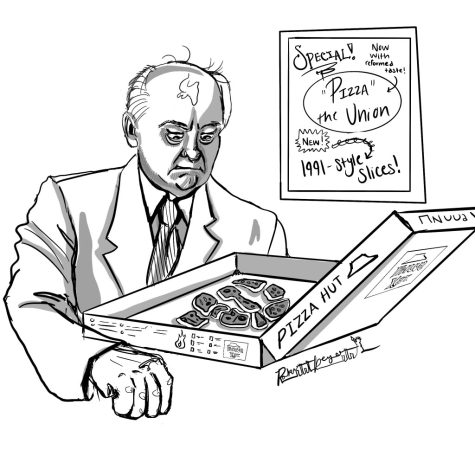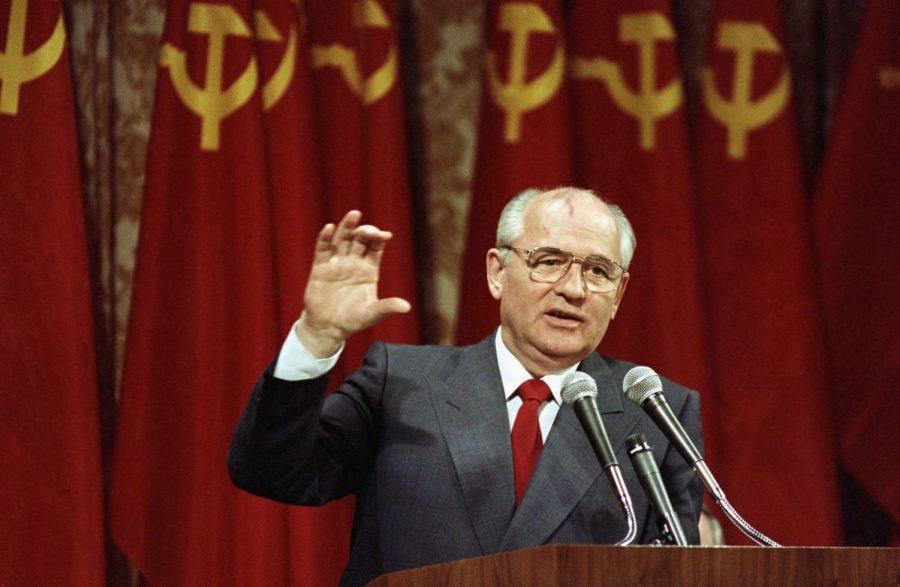Gorbachev’s death generates controversy
The death of the last leader of the Soviet Union has highlighted disparities between eastern and western opinion
Mikhail Gorbachev has been a polarizing figure, which continues into his death, writes Hope Zhu.
September 20, 2022
The famous 1998 commercial for Pizza Hut featuring Mikhail Gorbachev — the last leader of the Soviet Union — went viral after he died at 91 on Aug. 30, 2022.
At the start of the video, Gorbachev sliced the pizza for his granddaughter — like any normal grandfather would do — while people around him argued, “because of him, we have political instability!” and “because of him, we have more opportunity!”
It is hard to describe the subtle weirdness of pizza — something that is so modern, western and American — and the former president of the Soviet Union, a supposedly grave and solemn figure, being in the same frame. But such peculiarity is the most salient feature of Gorbachev, and it is also the reason for his controversial reputation.

For many members of Generation Z, the Soviet Union and its leadership seem to be buried in the dust of history. However, the international response to Gorbachev’s death reflects the long-lasting repercussions of his leadership. Eastern and western perceptions of Gorbachev still vary tremendously, which is somewhat reminiscent of the Cold War tension.
Gorbachev is widely praised in the west as an idealistic reformer, an advocate of peace and alliance throughout Eastern Europe and a hero credited with the relatively conflict-free dissolution of the Soviet Union.
In the westerner’s eyes, Gorbachev is not completely responsible for the collapse of the USSR, despite the failure of his major reforms including economic shock therapy and the transition to a free-market economy. At worst, he is seen as a mediocre leader who could not save the Soviet Union from corrupted bureaucracy and economic stagnation.
In the comment sections of opinion pieces from “The New York Times” discussing Gorbachev’s death, many contend that he deserves “global appreciation and recognition” and an open-minded diploma that enables the West to see a completely different Soviet Union.
In eastern countries such as Russia and China, however, Gorbachev was often portrayed as a traitor and, at best, a naive follower of Western ideology that proved to be incompatible with the old Soviet Union. National leaders from Russia are ambivalent, if not opposed, to Gorbachev’s legacy. Russian President Vladimir Putin famously dubbed the dissolution of the Soviet Union, as “the greatest geopolitical tragedy of the 20th century”.
Public opinion from China and Russia, while acknowledging the impact of Gorbachev on the Cold War trajectory, considers the misfires in his political career to outweigh his success. A 2017 survey shows that a majority of the Russian public (58%) believed that Stalin played a very or mostly positive role in Russia while very few
people (22%) felt the same way about Gorbachev, and the majority (65%) believed that Gorbachev played a negative role. In China, it is widely accepted that Gorbachev’s privatization efforts lacked flexibility and feasibility and his political reform deviated from scientific socialism, which is one of the essential parts of Marxism.
It is not difficult to trace the origin of this disparity, but the divergence between opinions reveals common biases when evaluating controversial historical figures.
For the countries that still uphold communist ideals, Gorbachev’s pro-western policies, along with increasingly negative portrayals of the USSR in the decades after its dissolution, have engendered bitterness.
Gorbachev indeed responded to the peaceful proposal by withdrawing a significant amount of Soviet tactical nuclear weapons from Eastern Europe and establishing diplomatic relationships with countries including the United States, contributing to the fall of the Berlin Wall, among other events. However, turning a vast and rigid nation from extremely conservative to liberal comes at an enormous cost. While the Western world applauds Gorbachev for his glasnost and perestroika, it turns its head away when the Gorbachevian Soviet Union society is haunted by revisionism, conspiracy and social unrest.
For the westerners, especially Americans, though, the Soviet Union was a mysterious but powerful sealed society. For this reason, the media and press are not entirely to blame for fabricating the Soviet Union’s image. By contrast, Gorbachev, who was young, energetic and willing to talk and smile to people on the street, is undeniably an attractive figure. He is a more westernized, more familiar representation of freedom and democracy, which is the golden rule of politics in Post Cold-War Europe and America. Many arguments praising Gorbachev for opening up the country to western ideas failed to recognize that the over-radicalization of a once rigid nation could also accelerate its collapse.
The stark contrast between the media representations of Gorbachev from the East and the West indicates that misinformation did not die with the last Soviet Union leader, nor is it likely to die in the future. In a contemporary world interconnected by globalization and multiculturalism, large-scale warfare like the current conflict in Ukraine has rarely occurred. Instead, media representation and maneuvering public opinions have become major battlefields.
There is already a plethora of incisive articles analyzing the historical resonance of Gorbachev that do a better job than I could. Yet, it is important to identify the challenge of objectively assessing a political figure during an extremely messy and turbulent time. For Gorbachev, neither “reformist of peace and vision” nor “gravedigger of communism” could capture his legacy.














